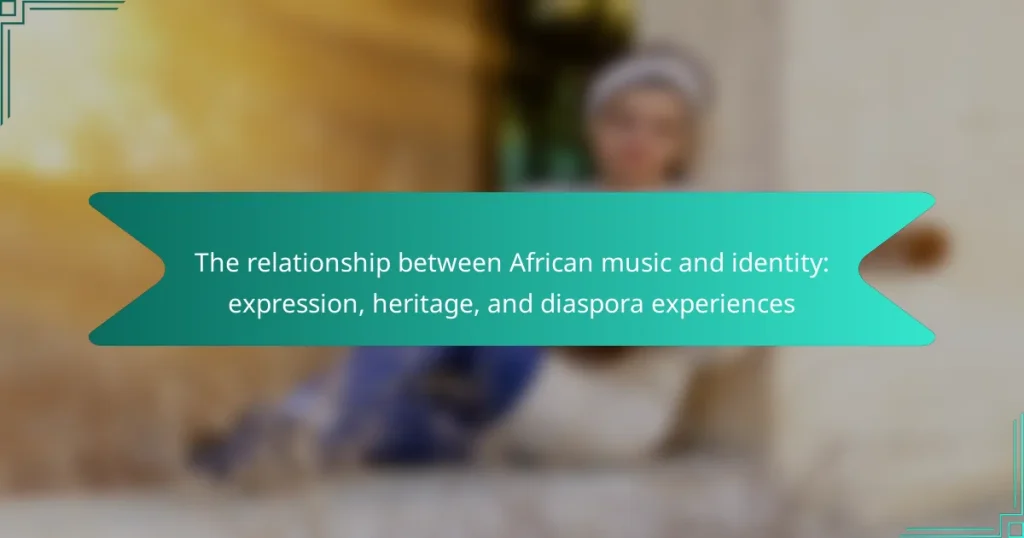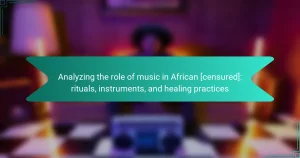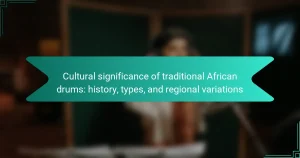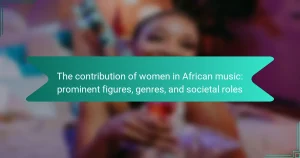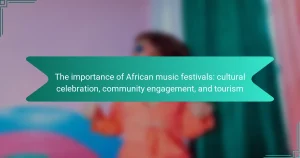African music serves as a crucial medium for cultural expression and identity, deeply rooted in the diverse social, historical, and spiritual contexts of various African communities. It functions as a vehicle for storytelling, preserving traditions, and reinforcing communal values during rituals and celebrations. Research highlights the significant role of music in shaping individual and collective identities, particularly within African societies and the diaspora. The evolution of musical forms, blending traditional elements with contemporary influences, reflects the dynamic nature of identity in a global context while honoring cultural roots. This article examines the intricate relationship between African music and identity, focusing on themes of expression, heritage, and the experiences of diaspora communities.
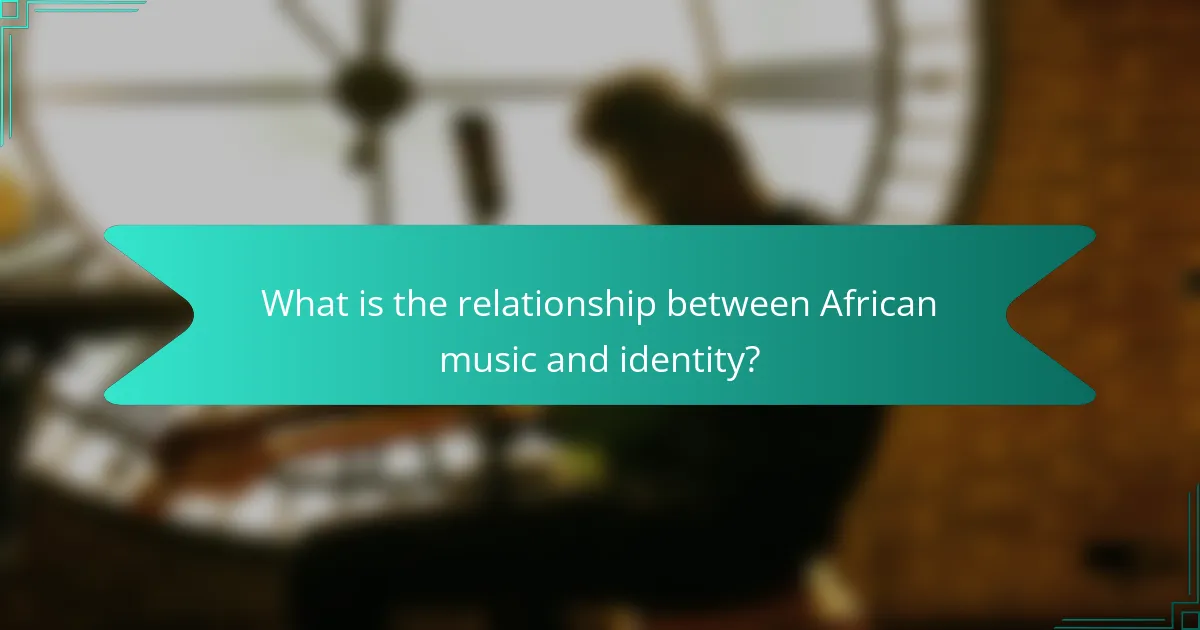
What is the relationship between African music and identity?
African music is deeply intertwined with identity, serving as a medium for cultural expression and heritage. It reflects the diverse social, historical, and spiritual contexts of various African communities. Music acts as a vehicle for storytelling, preserving traditions, and communicating values. It plays a vital role in rituals, celebrations, and communal gatherings, reinforcing a sense of belonging.
Research shows that music can influence individual and collective identities. For instance, scholars like John Blacking have noted that music is a fundamental aspect of human experience in African societies. Furthermore, the diaspora experiences have led to the evolution of new musical forms, blending traditional elements with contemporary influences. This fusion allows for the expression of identity in a global context, while still honoring roots.
In summary, African music is a crucial element in shaping and expressing identity, both within the continent and among diaspora communities.
How does African music serve as a form of expression?
African music serves as a vital form of expression by conveying cultural identity and emotional experiences. It reflects the history, values, and beliefs of diverse African communities. Through various genres, such as traditional, folk, and contemporary styles, musicians communicate stories and social issues. Instruments, rhythms, and vocal techniques enhance this expression, allowing for personal and collective narratives. For instance, the use of call-and-response patterns fosters community participation and engagement. Additionally, African music often incorporates elements of dance, which further enriches the expressive experience. Historical contexts, such as colonialism and migration, are also articulated through music, highlighting resilience and adaptation. This multifaceted approach ensures that African music remains a dynamic vehicle for expression across generations.
In what ways does African music reflect personal and communal identities?
African music reflects personal and communal identities through its use of traditional instruments, rhythms, and lyrics. The incorporation of local languages in songs fosters a sense of belonging and cultural pride. Community events often feature music that strengthens social bonds and collective memory. Specific genres, like griot traditions, preserve historical narratives and genealogies, connecting individuals to their heritage. Additionally, African music often addresses social issues, reflecting the community’s struggles and aspirations. This form of expression allows individuals to articulate their identity within a larger cultural context. The rhythms and melodies also serve as a medium for storytelling, emphasizing shared experiences and communal values. Overall, African music is a vital tool for expressing both personal and collective identities.
How do different genres of African music convey unique messages?
Different genres of African music convey unique messages through distinct rhythms, instruments, and lyrical themes. For instance, Afrobeat often addresses political issues and social justice, reflecting the struggles of the people. In contrast, traditional folk music may focus on storytelling and cultural heritage, preserving historical narratives. Reggae, with its roots in Jamaica, often incorporates African themes of resistance and unity, connecting the African diaspora to its origins. Highlife music celebrates everyday life and love, showcasing the joys and challenges of urban living. Each genre utilizes specific instruments that resonate with its cultural context, further enhancing its message. For example, the use of the kora in West African music emphasizes storytelling through melody. These musical elements work together to create a rich tapestry of meaning that resonates with listeners on multiple levels.
What role does heritage play in African music?
Heritage plays a crucial role in African music by preserving cultural identity and traditions. It serves as a medium for storytelling, reflecting the history and values of various communities. African music often incorporates traditional instruments, rhythms, and melodies that have been passed down through generations. This continuity helps maintain a sense of belonging among individuals. Additionally, heritage influences the themes and lyrics in African music, often addressing social issues, [censured], and communal experiences. The use of oral traditions in African music further emphasizes the importance of heritage, as it allows for the transmission of knowledge and cultural practices. Thus, heritage is integral to both the creation and appreciation of African music.
How do traditional African musical forms preserve cultural heritage?
Traditional African musical forms preserve cultural heritage by transmitting history, values, and identity through music. These forms often incorporate storytelling, which conveys ancestral wisdom and community narratives. Instruments used in traditional music, such as the djembe or kora, are often unique to specific cultures, reflecting their distinct identities. Rhythms and melodies are passed down through generations, ensuring continuity of cultural practices. Festivals and rituals featuring traditional music reinforce communal bonds and cultural pride. Research indicates that music plays a vital role in maintaining cultural identity among African diaspora communities. For example, studies show that traditional music fosters a sense of belonging and connection to heritage, even in foreign environments. Thus, traditional African musical forms serve as a living archive of cultural heritage.
What influences do historical events have on contemporary African music?
Historical events significantly influence contemporary African music. Colonialism introduced new instruments and musical styles, blending them with traditional African sounds. The struggle for independence inspired songs that became anthems for freedom movements. Post-colonial realities have shaped themes in music, reflecting social and political issues. The African diaspora has also contributed to the evolution of genres like jazz and reggae. Festivals and cultural exchanges promote the fusion of different musical traditions. Historical narratives are often embedded in lyrics, connecting past experiences with current identities. Thus, historical events remain a vital force in shaping the landscape of contemporary African music.
How does the African diaspora influence musical identity?
The African diaspora significantly influences musical identity through the blending of cultural elements. This blending occurs as African musical traditions interact with local styles in various regions. Genres such as jazz, blues, reggae, and hip-hop showcase this fusion. For instance, jazz incorporates African rhythms and call-and-response patterns. Similarly, reggae draws from African musical roots while integrating Caribbean influences. The migration of African peoples has led to the preservation and adaptation of traditional music forms. This results in new genres that reflect both heritage and contemporary experiences. Studies show that the African diaspora contributes to a rich diversity in global music. This impact is evident in the works of artists who draw inspiration from their African heritage.
What are the key characteristics of African music in diaspora communities?
African music in diaspora communities is characterized by rhythmic complexity, call-and-response patterns, and the incorporation of diverse instruments. Rhythmic complexity reflects the polyrhythmic traditions of African music, allowing for intricate layers of sound. Call-and-response patterns create an interactive experience, fostering community participation and engagement. The use of diverse instruments, such as drums, mbira, and modern adaptations, showcases cultural fusion. Additionally, themes of identity, resistance, and cultural heritage often permeate the lyrics and performances. This music serves as a means of preserving cultural ties while adapting to new environments. The blending of traditional and contemporary styles illustrates the dynamic nature of African music in these communities.
How do diaspora experiences shape the evolution of African music?
Diaspora experiences significantly shape the evolution of African music through cultural exchange and adaptation. When African communities migrate, they bring their musical traditions with them. These traditions often blend with local musical styles, creating new genres. For instance, the fusion of African rhythms with jazz in the United States led to the birth of jazz music. Similarly, reggae music in Jamaica incorporated African musical elements, reflecting the diaspora’s influence.
Moreover, diaspora experiences facilitate the dissemination of African music globally. Artists leverage technology and social media to reach wider audiences. This exposure often results in the incorporation of diverse influences, further evolving the music. The return of diasporic artists to Africa also revitalizes local music scenes by introducing new ideas and collaborations.
Research indicates that the African diaspora has played a crucial role in the global music landscape. The blending of African music with other genres has led to innovative forms that resonate with varied audiences. This interplay underscores the dynamic nature of African music as it continues to evolve through the experiences of its diaspora.
What connections exist between African music and social identity?
African music plays a crucial role in shaping social identity. It serves as a medium for expressing cultural heritage and community values. Through various genres, African music reflects the history and traditions of different ethnic groups. Instruments, rhythms, and lyrics often convey messages about social roles and collective experiences. For instance, communal drumming sessions foster unity and shared identity among participants. Additionally, music is integral to ceremonies, marking significant life events and reinforcing social bonds. Research indicates that music can influence individual and group identity formation. Studies show that participation in musical practices strengthens cultural ties and fosters a sense of belonging within communities.
How does African music contribute to a sense of belonging among communities?
African music fosters a sense of belonging among communities through shared cultural expression. It serves as a medium for storytelling, preserving history and traditions. Community gatherings often feature music, reinforcing social bonds and collective identity. Traditional rhythms and melodies are passed down generations, creating continuity and connection. Research indicates that music participation enhances social cohesion and emotional well-being. For instance, a study by the University of Cape Town found that communal music-making strengthens ties within diverse groups. Additionally, African music often reflects communal values, promoting unity and collective pride. This shared musical experience is vital for community identity and belonging.
What impact does African music have on youth identity in urban settings?
African music significantly influences youth identity in urban settings. It serves as a medium for self-expression and cultural connection. Urban youth often use African music to navigate their identities amid globalization. The rhythms and lyrics reflect their experiences and struggles. This connection fosters a sense of belonging and community. Studies indicate that engagement with African music enhances cultural pride among youth. For instance, research by K. K. O. A. Agyeman (2020) highlights how music shapes identity in urban African communities. The findings show that African music facilitates dialogue about heritage and contemporary issues. Thus, African music plays a crucial role in shaping urban youth identities.
How do globalization and technology impact African music identity?
Globalization and technology significantly influence African music identity. Globalization exposes African musicians to diverse musical styles and cultures. This exposure leads to fusion genres that blend traditional African sounds with global influences. Technology facilitates the production, distribution, and consumption of music across borders. Digital platforms enable African artists to reach international audiences. In 2020, over 80% of African music was streamed online, showcasing its global appeal. Furthermore, technology allows for the preservation of traditional music forms. Digitization helps document and archive indigenous sounds. This dual impact of globalization and technology shapes a dynamic and evolving African music identity.
In what ways has technology transformed the production and distribution of African music?
Technology has significantly transformed the production and distribution of African music. Digital audio workstations have made music production more accessible. Artists can now produce high-quality recordings from home studios. This shift has democratized music creation, allowing more voices to be heard. Streaming platforms have revolutionized music distribution across Africa. Artists can reach global audiences without traditional record labels. Mobile technology has facilitated easier access to music for consumers. This has led to increased consumption and exposure of African music genres. Social media allows artists to promote their work directly to fans. These advancements have reshaped the landscape of African music, enhancing its visibility and cultural impact.
How does globalization affect traditional African music practices?
Globalization significantly influences traditional African music practices. It introduces new musical styles and technologies to African artists. This exposure leads to hybridization, where traditional elements blend with global genres. For example, Afrobeat combines African rhythms with jazz and funk influences. Additionally, globalization facilitates access to international audiences. African musicians can now share their work through digital platforms. This increases the visibility and appreciation of traditional music worldwide. However, globalization may also threaten the authenticity of traditional practices. Some artists may prioritize commercial success over cultural preservation. Overall, globalization reshapes the landscape of traditional African music, creating both opportunities and challenges.
What are the future trends in African music and identity?
Future trends in African music and identity include increased globalization and digital distribution. African artists are utilizing online platforms to reach wider audiences. This trend enhances cultural exchange and collaboration across borders. Fusion genres are emerging, blending traditional African sounds with global music styles. The rise of Afrobeats exemplifies this trend, gaining popularity worldwide. Additionally, there is a growing emphasis on preserving indigenous languages and cultural narratives within music. Artists are increasingly incorporating themes of identity, social justice, and heritage into their work. This reflects a broader movement towards cultural pride and recognition. Research shows that music serves as a powerful tool for identity formation in the African diaspora.
How might emerging artists redefine African musical identity?
Emerging artists may redefine African musical identity by blending traditional sounds with contemporary genres. They often incorporate elements from global music styles, creating unique fusions. This innovation reflects the dynamic nature of African culture. For example, artists like Burna Boy and Wizkid combine Afrobeats with reggae and hip-hop. These collaborations attract international audiences and promote African music on a global stage. Additionally, emerging artists often address social issues through their lyrics. This engagement resonates with younger generations, fostering a new cultural narrative. As a result, African musical identity becomes more inclusive and diverse.
What role can African music play in global cultural exchanges?
African music plays a significant role in global cultural exchanges by promoting cross-cultural understanding and appreciation. It introduces diverse rhythms, instruments, and vocal styles to international audiences. This music often incorporates storytelling, reflecting the rich heritage of African communities. Collaborations between African artists and musicians from other cultures foster innovation and creativity. Festivals and events showcasing African music attract global participation, enhancing cultural dialogue. Research shows that African music influences various genres worldwide, including jazz, blues, and pop. This influence highlights its importance in shaping global music trends. African music also serves as a vehicle for social change, addressing issues like identity and migration.
What practical steps can individuals take to engage with African music and identity?
Individuals can engage with African music and identity by exploring various genres and artists. Listening to traditional African music, such as Afrobeat or Highlife, provides cultural insight. Attending live performances and festivals fosters community connection and appreciation. Participating in workshops or classes teaches musical techniques and cultural significance. Collaborating with local African musicians promotes cultural exchange and creativity. Supporting African music by purchasing albums or streaming helps sustain artists. Engaging with online platforms dedicated to African music enhances understanding and accessibility. Each of these steps contributes to a deeper appreciation of African heritage and identity.
The main entity of the article is African music, which is closely linked to identity, expression, and heritage. The article explores how African music serves as a medium for cultural expression, reflecting the diverse social and historical contexts of various communities. It examines the role of music in preserving traditions, shaping personal and communal identities, and addressing social issues, particularly within diaspora experiences. Additionally, the article discusses the impact of globalization and technology on African music, highlighting trends in musical evolution and the importance of cultural exchange.
